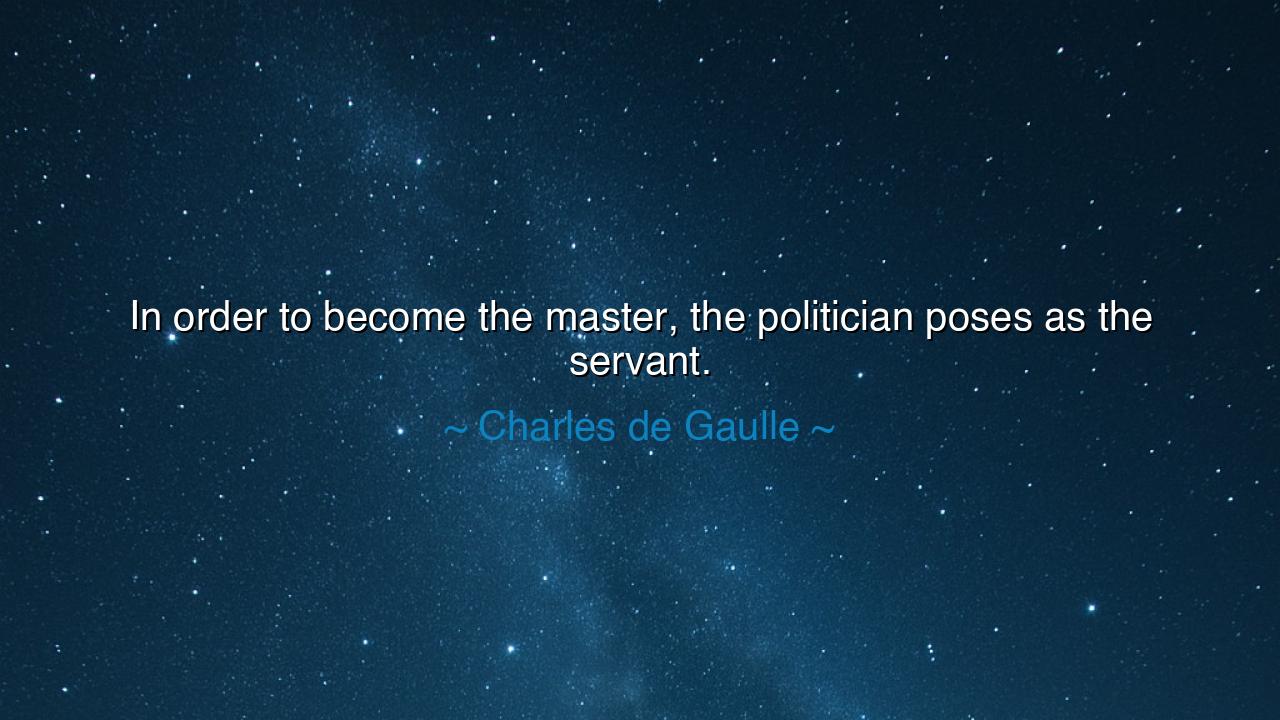
In order to become the master, the politician poses as the






Charles de Gaulle, soldier of France and architect of her rebirth, once revealed with the clarity of a prophet: “In order to become the master, the politician poses as the servant.” In this single stroke of irony, he unmasks the oldest art of power. For the politician, desiring to rule, does not seize the throne with bare hands. Instead, he bends low, cloaking himself in humility, promising to serve the people, until trust is given freely. Only then does he rise, not as servant, but as master.
The origin of this wisdom springs from de Gaulle’s long battles with power—both his own and that of others. He had watched leaders of the Third Republic bow to the people’s will with honeyed words, even as they preserved their own privileges. He himself, in founding the Fifth Republic, understood that authority rests upon the illusion of service. The politician speaks of duty and sacrifice, yet often these are but steps upon the ladder to dominion. De Gaulle’s remark is not mere cynicism, but a warning: discern between true service and the mask of it.
History bears this truth upon its face. In ancient Rome, Julius Caesar declared himself the “humble defender” of the common people, opposing the Senate’s arrogance. He posed as their servant, granting bread and games, winning their love. Yet in time he cast aside the mask, seizing perpetual dictatorship. What began as service ended as sovereignty. De Gaulle, ever the student of history, knew well how often ambition clothes itself in robes of humility.
So too in the tale of Napoleon Bonaparte, who spoke first of saving the Republic, of defending liberty against monarchs and tyrants. He wrapped himself in the language of equality, a servant of the revolution. Yet soon he crowned himself Emperor, master of France and scourge of Europe. The servant had been but a mask; the master was his true desire. De Gaulle, heir to this legacy, spoke his words as both critique and caution, lest men confuse humility with truth.
Therefore, O seekers of wisdom, remember this lesson: power often comes veiled in the garments of service. The true servant sacrifices without thought of gain; the false servant sacrifices only to ascend. The politician becomes master by posing as servant, but the wise citizen will pierce the mask. For freedom is preserved not by trusting appearances, but by judging deeds. And only when the people demand true service will they prevent the servant’s mask from hardening into the master’s crown.






KNKien Nguyen
De Gaulle’s observation about politicians posing as servants really highlights the manipulative side of politics. It’s a reminder that appearances can be deceiving, and sometimes the people who claim to be working for us may have their own agendas. How do we hold politicians accountable when they use our trust for their own rise to power?
SNSon Nguyen
This quote raises an important point about the strategic positioning of politicians. It makes me wonder how often leaders exploit the façade of humility to hide their true ambitions. Can a politician truly serve the people if they are always positioning themselves for greater power? How can we as citizens encourage more transparency in leadership?
TLDuong Thi Tung Lam
I find it fascinating how de Gaulle touches on the duality of political life. Leaders who appear humble and devoted to serving the public might be doing so for strategic reasons rather than out of genuine concern. What does this mean for the way we choose our leaders? Should we focus more on actions than words?
TNTUONG NHI
Charles de Gaulle’s quote seems to suggest that the nature of politics involves manipulation. It’s unsettling to think that people who claim to work for us may be using our trust to gain power for their own purposes. How can voters distinguish between those who are genuinely serving the public and those who are simply posturing to secure power for themselves?
HNNguyen Tran Hai Nhim
Isn't it interesting how power often operates through deception? The idea that politicians present themselves as servants while seeking to gain control shows the complexities of leadership. Does this mean that genuine service to the public is impossible within the political system? Or are there exceptions where true leaders prioritize the well-being of their people over personal gain?